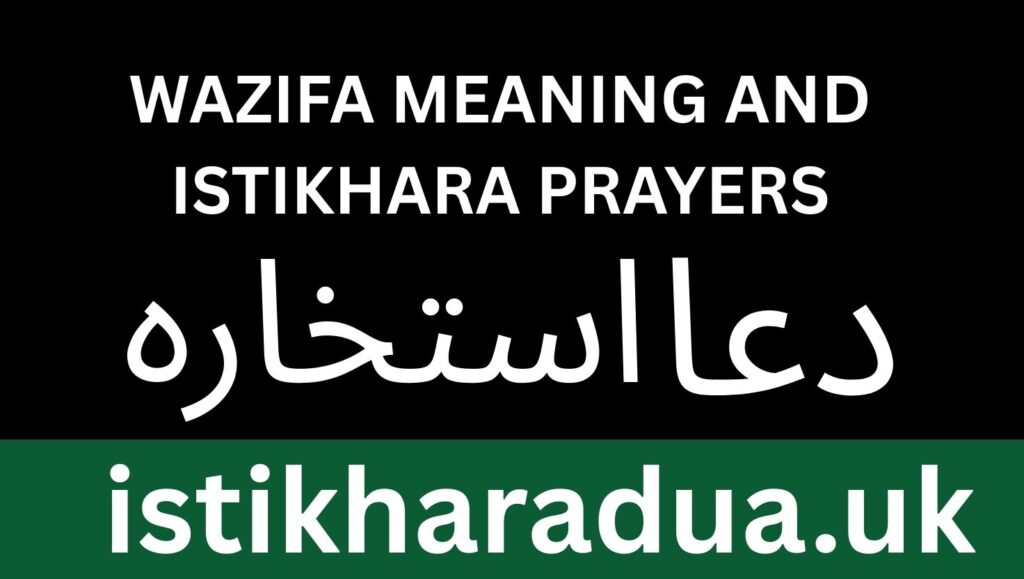
Unlocking Wazifa Meaning and Istikhara Prayers in Islam
Right after facing a crossroads—like choosing a job or a life partner—turn to wazifa meaning and istikhara prayer. This simple two-rak’ah prayer plus a heartfelt dua invites Allah’s wisdom, easing anxiety and confusion in just minutes. (38 words)
Imagine you’re a young professional in a bustling city, heart racing over a career switch. The bills pile up, doubts swirl—does this path lead to barakah or regret? That’s where wazifa meaning and istikhara prayer steps in as your spiritual compass. In Islam, these aren’t just rituals; they’re lifelines for the overwhelmed soul, blending recitation with surrender.
As someone who’s felt that knot of indecision myself (or heard countless stories from friends), I get it—the fear of choosing wrong. But here’s the beauty: Allah promises guidance to those who ask sincerely. Today, we’ll dive deep into wazifa meaning and istikhara prayer, unpacking their essence, steps, and transformative power. Whether you’re a beginner dipping toes into Islamic supplications or seeking fresh insights, this guide is your empathetic companion.
H2: The Spiritual Heart of Wazifa and Its Role in Everyday Faith
Wazifa, at its core, is more than repetition—it’s a devoted act of turning to Allah through specific Islamic supplications or Quranic recitation. Derived from the Arabic root “wazaf” meaning to “assign” or “prescribe,” wazifa meaning and istikhara prayer often overlap in practice, especially for guidance. Think of it as Allah’s prescribed medicine for the heart’s uncertainties.
In the Sunnah, the Prophet Muhammad (PBUH) exemplified this through regular dhikr and duas, teaching us that consistent wazifa builds taqwa (God-consciousness). For instance, reciting “SubhanAllah” 100 times daily isn’t magic—it’s rewiring your soul toward peace. But why pair it with istikhara? Because wazifa amplifies the prayer for decision making, turning a one-off plea into a habit of reliance.
What Exactly Is Wazifa? A Beginner Breakdown
If you’re new, wazifa meaning and istikhara prayer might sound intimidating, but it’s beginner-friendly. Wazifa is any assigned recitation from the Quran or authentic hadith istikhara—say, Ayat al-Kursi after Fajr for protection. Scholars like Ibn Qayyim emphasize its role in spiritual purification, drawing from Surah Al-Ankabut (29:45): “Indeed, prayer prohibits immorality and wrongdoing.”
Common pain point: “I try, but my mind wanders.” Start small—five minutes post-prayer. Over time, it eases anxiety, fostering the calm needed for salat al-istikhara.
Linking Wazifa to Broader Islamic Supplications
Wazifa isn’t isolated; it’s woven into daily ibadah. For guidance, combine it with istikhara dua, reciting Surah Al-Fatiha’s opening as a wazifa for clarity. This echoes the Quran’s call in Surah Al-Baqarah (2:186): “When My servants ask you about Me, indeed I am near. I respond to the invocation of the supplicant when he calls upon Me.” Real talk: In a world of endless options, this practice grounds you, reducing decision paralysis.
The Power of Salat al-Istikhara: Steps and Soulful Insights
Now, let’s get practical. How to perform istikhara? It’s a two-rak’ah nafl prayer followed by a specific dua, but infused with wazifa for deeper connection. The Prophet (PBUH) taught this in Sahih al-Bukhari: “If anyone of you intends to do something, he should offer a two-rak’ah prayer other than the obligatory ones and then say [the istikhara dua].” No fancy setup needed—just sincerity.
Step-by-Step: How to Perform Istikhara with Wazifa Elements
- Intention (Niyyah): Silently affirm, “I’m seeking Allah’s guidance via wazifa meaning and istikhara prayer for [your matter].”
- Two Rak’ahs: Pray like any nafl—Surah Al-Fatiha plus a short surah (e.g., Al-Ikhlas). Add a wazifa touch: Recite “Ya Hadi” (O Guide) 11 times after.
- The Dua: Raise hands and recite the authentic istikhara dua: “Allahumma inni astakhiruka bi’ilmika…” (O Allah, I seek Your guidance by Your knowledge…). Feel the vulnerability—it’s okay to tear up.
- Post-Prayer Wazifa: For reinforcement, recite Surah Ad-Duha (93) seven times as a wazifa for guidance, trusting signs come via ease or heart’s inclination.
Beginner tip: Do it at night; dreams aren’t mandatory, but a peaceful heart is the real sign. If anxiety spikes, remember: Allah doesn’t burden beyond capacity (Quran 2:286).
Benefits of Istikhara: Beyond the Obvious
Why bother? The benefits of istikhara ripple—clarity reduces regret, strengthens iman, and invites barakah. Studies from Islamic psychology (inspired by scholars like Al-Ghazali) show it lowers stress, much like mindfulness rooted in faith. One secondary perk: It busts the myth that “good” choices feel instant—sometimes ease unfolds gradually.
Busting Common Myths Around Wazifa Meaning and Istikhara Prayer
Let’s address the elephants in the room—those whispers of doubt that keep you from starting.
Myth 1: Istikhara Is Only for Big Decisions Like Marriage. Nope! The hadith covers “any matter,” from career tweaks to daily dilemmas. A sister once shared how istikhara clarified a simple move—saving her from hidden stress.
Myth 2: Wazifa Guarantees Instant Results, Like a Magic Spell. Heartbreakingly false. Wazifa meaning and istikhara prayer are submissions, not transactions. As Imam Nawawi notes, outcomes align with what’s best for your akhirah, not always dunya wins.
Myth 3: You Need a Sheikh to Interpret Signs. Empowering truth: Allah speaks directly to your qalb (heart). Consult if needed, but don’t outsource your intuition.
These busts free beginners from perfectionism—start messy, refine with practice.
Real-Life Examples: Stories of Guidance in Action
Stories hit home, right? Let’s share a few (anonymized for privacy) to show wazifa meaning and istikhara prayer at work.
Example 1: A Student’s Pivot. Amina, 22, agonized over majors—art or engineering? After salat al-istikhara with a wazifa of Surah Al-Inshirah (94) 21 times, unease lifted toward art. Today, she’s thriving as a designer, crediting that prayer for aligning her passion with purpose.
Example 2: Family Healing. Brother Ahmed faced marital strain. Performing istikhara dua nightly, paired with wazifa for guidance (reciting “Hasbunallah wa ni’mal wakeel” 100 times), brought subtle shifts—better communication, renewed love. “It wasn’t fireworks,” he says, “but steady light.”
Example 3: Career Crossroads. Fatima, a mom of three, debated quitting her draining job. Post-istikhara, doors opened unexpectedly—a flexible remote role. Her tip? Journal feelings pre- and post-prayer for patterns.
These aren’t rarities; they’re proofs of Allah’s nearness in seeking Allah’s guidance.
Beginner Tips: Making Wazifa and Istikhara Your Daily Anchor
Feeling overwhelmed? Here’s your starter kit, empathetic and bite-sized:
- Tip 1: Set a “guidance hour”—post-Isha, dim lights, no phone. Recite istikhara even for small stuff to build the habit.
- Tip 2: Track in a journal: “Pre-prayer doubts vs. post-peace.” This uncovers benefits of istikhara subtly.
- Tip 3: Pair with sunnah—eat dates before for barakah, invoking “Bismillah” as a mini-wazifa.
- Pro Hack: If Arabic trips you, learn transliteration apps. Allah values effort over eloquence.
Remember, it’s not about flawlessness—it’s showing up for your soul.
Case Study: From Despair to Direction—A Journey with Wazifa and Istikhara
Meet Omar, a 35-year-old entrepreneur in Dubai, circa 2023. His startup teetered on collapse amid economic dips—investors pulled out, team morale tanked. Nights blurred into anxiety attacks; “Is this my fault? Should I fold?” he wondered, faith flickering under pressure.
Desperate, Omar recalled a khutbah on salat al-istikhara. That Maghrib, he performed it earnestly, weaving in a wazifa for guidance: Reciting Surah Yusuf (12) verses 83-86 (Yaqub’s plea for patience) 11 times daily. The dua flowed: “O Allah, if this business is khair for me, ease it; if not, turn my heart away.”
Days one to three: Silence. No dreams, just restlessness. But by day five, a subtle shift— an old contact emailed about a pivot to eco-friendly products, aligning with Omar’s values. He repeated istikhara thrice more, each time adding authentic hadith istikhara reflections from Bukhari. Signs emerged: Ease in negotiations, a team’s renewed spark, and an inner calm whispering, “Proceed.”
Six months later? The rebranded venture thrives, employing locals and donating zakat. Omar’s reflection: “Wazifa meaning and istikhara prayer didn’t fix everything overnight—it taught surrender. My turnover doubled, but the real win? Trusting Allah over my fears.” Scholars like Sheikh Uthaymeen affirm this: Istikhara aligns us with divine qadr, turning trials to triumphs (Quran 65:2-3: “Whoever fears Allah—He will make for him a way out”).
Omar’s story? A testament for us all—guidance awaits the seeker.
Internal Links for Deeper Dives
- Explore more on daily duas for anxiety relief to complement your wazifa practice.
- Ready for advanced recitation? Check our guide on the importance of Surah Yaseen for layered spiritual benefits.
- Struggling with consistency? Dive into hadith on patience and tawakkul for motivation.
Frequently Asked Questions About Istikhara & Wazifa
What is the translation of Dua e Istikhara?
It’s an English supplication asking Allah for guidance in decisions, prayed after two rak’ahs, seeking what’s best for faith and life.
Can I recite Dua e Istikhara in English?
Yes. The English translation is valid if sincere, though scholars recommend learning the Arabic for barakah while using translation to understand meaning.
What’s the meaning of Istikhara prayer?
Istikhara means seeking Allah’s best choice for your affairs, asking for what benefits your religion and worldly life, and being content with His decree.
Is a dream needed after Istikhara?
No. Dreams are not required. Guidance commonly appears as ease, obstacles, inner peace, or changing circumstances rather than a specific dream.
When to use Dua e Istikhara?
Use Istikhara for any halal decision when uncertain—after research and consultation. Many prefer night-time for calm, but any sincere time is acceptable.
How to understand Istikhara signs?
Look for ease or difficulty in pursuing the option, inner attraction or aversion, and changes in circumstances. If unclear, repeat Istikhara and trust Allah.
Is the translation enough for beginners?
Yes. Translation helps beginners connect to the dua’s meaning. Prioritize sincerity; gradually learn the Arabic text for spiritual benefit.
What is wazifa meaning?
Wazifa refers to prescribed supplications or recitations from the Qur’an and Sunnah, repeated with intention to seek spiritual benefits and closeness to Allah.
How do I start Istikhara prayer?
Pray two voluntary (nafl) rak'ahs with the intention of seeking guidance, then recite the Istikhara dua from the Hadith, asking Allah to guide you to what is best.
Can I do wazifa for guidance daily?
Yes. You can combine regular supplications or short wazifas with Istikhara for ongoing clarity. Ensure practices align with Islamic teachings and avoid innovation.
What are signs after Istikhara?
Signs include feeling ease or difficulty, inner comfort or unease about a choice, or external changes that make a path clearer. Interpret signs with caution and prayer.
Is Istikhara only for Muslims?
Istikhara is an Islamic supplication tied to faith in Allah. Its core—seeking higher guidance—has universal value, but the ritual form is specific to Muslim practice.
How often to repeat Istikhara dua?
One sincere Istikhara is often sufficient. Some repeat up to seven times if uncertain. Combine with consultation and practical steps rather than relying solely on repetition.
Does wazifa guarantee results?
No guarantee. Wazifa and supplication invite barakah and guidance, but outcomes follow Allah’s wisdom and what is ultimately best for you.
Author Bio
Maira Kamran is a passionate content writer dedicated to creating informative and engaging content that resonates with readers. With a focus on Islamic practices and lifestyle, Maira aims to provide valuable insights to help readers navigate their spiritual and everyday lives. Visit her whatsapp, for more helpful resources and guides.
